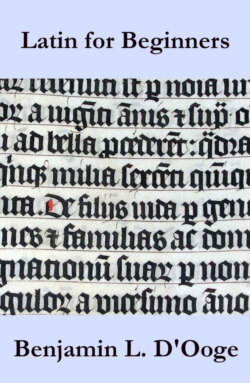Читать книгу Latin for Beginners - BENJAMIN L. D’OOGE - Страница 31
На сайте Литреса книга снята с продажи.
LESSON VI
ОглавлениеFIRST PRINCIPLES (Continued)
[Special Vocabulary]
ADJECTIVES «bona», good «grāta», pleasing «magna», large, great «mala», bad, wicked «parva», small, little «pulchra», beautiful, pretty «sōla», alone
NOUNS
ancil´la, maidservant Iūlia, Julia
ADVERBS[A]
«cūr», why «nōn», not
PRONOUNS
«mea», my; «tua», thy, your (possesives) «quid», interrog. pronoun, nom. and acc. sing., what?
«-ne», the question sign, an enclitic (§16) added to the first word, which, in a question, is usually the verb, as «amat», he loves, but «amat´ne»? does he love? «est», he is; «estne»? is he? Of course «-ne» is not used when the sentence contains «quis», «cūr», or some other interrogative word.
[Footnote A: An adverb is a word used to modify a verb, an adjective, or another adverb; as, She sings sweetly; she is very talented; she began to sing very early.]
«48.» «The Ablative Case.» Another case, lacking in English but found in the fuller Latin declension, is the ab´la-tive.
«49.» When the nominative singular ends in «-a», the ablative singular ends in «-ā» and the ablative plural in «-īs».
a. Observe that the final -ă of the nominative is short, while the final -ā of the ablative is long, as,
Nom. fīliă Abl. fīliā
b. Observe that the ablative plural is like the dative plural.
c. Form the ablative singular and plural of the following nouns: «fuga», «causa», «fortūna», «terra», «aqua», «puella», «agricola», «nauta», «domina».
«50.» «The Ablative Relation.» The ablative case is used to express the relations conveyed in English by the prepositions from, with, by, at, in. It denotes
1. That from which something is separated, from which it starts, or of which it is deprived—generally translated by from.
2. That with which something is associated or by means of which it is
done—translated by with or by.
3. The place where or the time when something happens—translated by in or at.
a. What ablative relations do you discover in the following?
In our class there are twenty boys and girls. Daily at eight o’clock they come from home with their books, and while they are at school they read with ease the books written by the Romans. By patience and perseverance all things in this world can be overcome.
«51.» «Prepositions.» While, as stated above (§41), many relations expressed in English by prepositions are in Latin expressed by case forms, still prepositions are of frequent occurrence, but only with the accusative or ablative.
«52.» RULE. «Object of a Preposition.» A noun governed by a preposition must be in the Accusative or Ablative case.
«53.» Prepositions denoting the ablative relations from, with, in, on, are naturally followed by the ablative case. Among these are
«ā»[1] or «ab», from, away from «dē», from, down from «ē»[1] or «ex», from, out from, out of «cum», with «in», in, on
[Footnote 1: «ā» and «ē» are used only before words beginning with a consonant; «ab» and «ex» are used before either vowels or consonants.]
1. Translate into Latin, using prepositions. In the water, on the land, down from the forest, with the fortune, out of the forests, from the victory, out of the waters, with the sailors, down from the moon.
«54.» «Adjectives.» Examine the sentence
«Puella parva bonam deam amat», the little girl loves the good goddess
In this sentence «parva» (little) and «bonam» (good) are not nouns, but are descriptive words expressing quality. Such words are called adjectives,[2] and they are said to belong to the noun which they describe.
[Footnote 2: Pick out the adjectives in the following: “When I was a little boy, I remember that one cold winter’s morning I was accosted by a smiling man with an ax on his shoulder. ‘My pretty boy,’ said he, ‘has your father a grindstone?’ ‘Yes, sir,’ said I. ‘You are a fine little fellow,’ said he. ‘Will you let me grind my ax on it?’”]
You can tell by its ending to which noun an adjective belongs. The ending of «parva» shows that it belongs to «puella», and the ending of «bonam» that it belongs to «deam». Words that belong together are said to agree, and the belonging-together is called agreement. Observe that the adjective and its noun agree in number and case.
«55.» Examine the sentences
«Puella est parva»,
the girl is little «Puella parva bonam deam amat», the little girl loves the good goddess
In the first sentence the adjective «parva» is separated from its noun by the verb and stands in the predicate. It is therefore called a predicate adjective. In the second sentence the adjectives «parva» and «bonam» are closely attached to the nouns «puella» and «deam» respectively, and are called attributive adjectives.
a. Pick out the attributive and the predicate adjectives in the following:
Do you think Latin is hard? Hard studies make strong brains. Lazy students dislike hard studies. We are not lazy.
